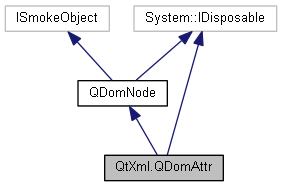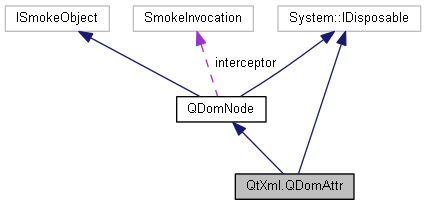|
Qyoto
4.0.5
Qyoto is a C# language binding for Qt
|
|
Qyoto
4.0.5
Qyoto is a C# language binding for Qt
|
The QDomAttr class represents one attribute of a QDomElement. More...


Protected Member Functions | |
| QDomAttr (System.Type dummy) | |
 Protected Member Functions inherited from QtXml.QDomNode Protected Member Functions inherited from QtXml.QDomNode | |
| QDomNode (System.Type dummy) | |
Properties | |
| new string | Value [get, set] |
| | |
 Properties inherited from QtXml.QDomNode Properties inherited from QtXml.QDomNode | |
| new string | NodeValue [get, set] |
| | |
| new string | Prefix [get, set] |
| | |
| virtual System.IntPtr | SmokeObject [get, set] |
Additional Inherited Members | |
 Public Types inherited from QtXml.QDomNode Public Types inherited from QtXml.QDomNode | |
| enum | EncodingPolicy { EncodingFromDocument = 1, EncodingFromTextStream = 2 } |
| More... | |
| enum | NodeType { AttributeNode = 2, BaseNode = 21, CDATASectionNode = 4, CharacterDataNode = 22, CommentNode = 8, DocumentFragmentNode = 11, DocumentNode = 9, DocumentTypeNode = 10, ElementNode = 1, EntityNode = 6, EntityReferenceNode = 5, NotationNode = 12, ProcessingInstructionNode = 7, TextNode = 3 } |
| More... | |
 Static Public Member Functions inherited from QtXml.QDomNode Static Public Member Functions inherited from QtXml.QDomNode | |
| static bool | operator!= (QDomNode arg1, QDomNode arg2) |
| | |
| static bool | operator== (QDomNode arg1, QDomNode arg2) |
| | |
 Protected Attributes inherited from QtXml.QDomNode Protected Attributes inherited from QtXml.QDomNode | |
| SmokeInvocation | interceptor |
The QDomAttr class represents one attribute of a QDomElement.
For example, the following piece of XML produces an element with no children, but two attributes:
<link href="http://qt.nokia.com" color="red" />
You can access the attributes of an element with code like this:
QDomElement e = //...
//...
QDomAttr a = e.attributeNode("href");
cout << a.value() << endl; // prints "http://qt.nokia.com"
a.setValue("http://qt.nokia.com/doc"); // change the node's attribute
QDomAttr a2 = e.attributeNode("href");
cout << a2.value() << endl; // prints "http://qt.nokia.com/doc"
This example also shows that changing an attribute received from an element changes the attribute of the element. If you do not want to change the value of the element's attribute you must use cloneNode() to get an independent copy of the attribute.
QDomAttr can return the name() and value() of an attribute. An attribute's value is set with setValue(). If specified() returns true the value was set with setValue(). The node this attribute is attached to (if any) is returned by ownerElement().
For further information about the Document Object Model see http://www.w3.org/TR/REC-DOM-Level-1/ and http://www.w3.org/TR/DOM-Level-2-Core/. For a more general introduction of the DOM implementation see the QDomDocument documentation.
|
protected |
| QtXml.QDomAttr.QDomAttr | ( | ) |
Constructs an empty attribute.
| QtXml.QDomAttr.QDomAttr | ( | QDomAttr | x | ) |
Constructs a copy of x.
The data of the copy is shared (shallow copy): modifying one node will also change the other. If you want to make a deep copy, use cloneNode().
|
virtual |
Reimplemented from QtXml.QDomNode.
| new void QtXml.QDomAttr.Dispose | ( | ) |
| new string QtXml.QDomAttr.Name | ( | ) |
Returns the attribute's name.
| new QDomNode.NodeType QtXml.QDomAttr.nodeType | ( | ) |
Returns AttributeNode.
| new QDomElement QtXml.QDomAttr.OwnerElement | ( | ) |
Returns the element node this attribute is attached to or a null node if this attribute is not attached to any element.
| new bool QtXml.QDomAttr.Specified | ( | ) |
Returns true if the attribute has been set by the user with setValue(). Returns false if the value hasn't been specified or set.
See also setValue().
|
getset |
Returns the value of the attribute or an empty string if the attribute has not been specified.
Sets the attribute's value to v.